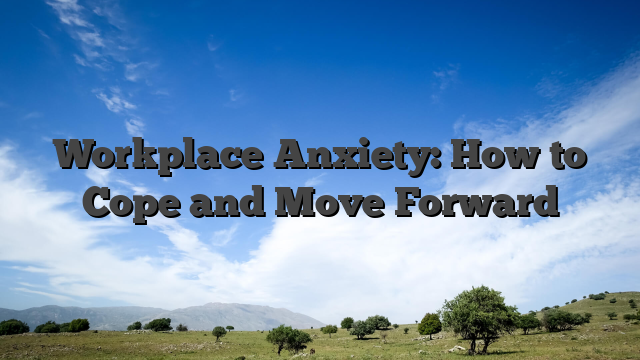Workplace anxiety is a common and often distressing experience for many individuals. It refers to the feelings of unease, tension, or fear that can arise in response to various work-related factors. These may include demanding job expectations, interpersonal conflicts, performance pressures, and job insecurity. The symptoms of workplace anxiety can manifest both mentally and physically, impacting an individual’s emotional well-being and job performance.
Is it normal to have workplace anxiety?
Yes, it’s entirely normal to experience some degree of workplace anxiety from time to time. Jobs often come with deadlines, expectations, and challenges that can naturally lead to occasional stress or anxiety. This kind of anxiety is a common response to the demands of work and is usually manageable. It can even motivate individuals to perform their best. However, if workplace anxiety becomes persistent, overwhelming, or starts to significantly affect your well-being and job performance, it may be a sign to seek support or implement coping strategies.
Strategies for Managing Workplace Anxiety
If you find managing workplace anxiety challenging, seeking support from a “therapist near me” can be instrumental in the healing process. Here are some effective strategies to help you cope with workplace anxiety:
- Identify Triggers: Recognize specific situations or factors in your workplace that trigger anxiety. Is it a particular task, colleague, or deadline? Understanding your triggers can help you address them more effectively.
- Time Management: Organize your tasks and prioritize them. Put chores on a to-do list and divide larger ones into more manageable chunks. It is possible to lessen the overwhelming sense of time pressure.
- Goals should be realistic: Be careful not to hold oneself to unattainable standards. Be honest about what you can accomplish within a given timeframe and seek assistance or delegate when necessary.
- Practice these relaxation methods: Exercises for relaxation should be a part of your everyday practice. Deep breathing, meditation, progressive muscle relaxation, or mindfulness can help calm your mind and reduce physical tension.
- Effective Communication: If workplace conflicts or misunderstandings contribute to your anxiety, practice open and assertive communication. Address issues promptly and professionally with colleagues or supervisors.
- Seek Social Support: Share your feelings with trusted colleagues, friends, or family members. Sometimes, talking about your concerns can provide relief and a fresh perspective.
- During the course of the working day:- it is imperative to take regular breaks. Step away from your desk, go for a walk, or engage in brief relaxation exercises to recharge and refocus.
- Set Boundaries: Define the limits that separate your personal and professional lives. Avoid checking work-related emails or messages during off-hours, and make time for activities and hobbies you enjoy.
- Professional Counseling: Consider seeking professional help if Job-related stress persists or significantly affects your well-being. Therapists or counselors can provide coping strategies and support tailored to your specific needs.
- Exercise and Healthy Lifestyle: Regular physical activity, a balanced diet, and adequate sleep contribute to overall stress reduction and emotional well-being.
Remember that managing Work-induced nervousness is an ongoing process, and it may require a combination of these strategies. Utilizing “Online counselling” can be a valuable resource in handling workplace anxiety effectively.
When Should You Seek Help for Workplace Anxiety?
Seeking help for workplace anxiety is essential when the symptoms and effects of anxiety become overwhelming, persistent, or detrimental to your overall well-being and job performance. Here are some indicators of when it may be time to seek professional assistance for Office tension:
- Persistent Symptoms: If you experience ongoing symptoms of Work-induced nervousness, such as excessive worry, physical tension, restlessness, or sleep disturbances, despite efforts to manage them on your own.
- Interference with Daily Life: When Work-related agitation starts to interfere with your daily life outside of work, it affects your relationships, personal activities, and overall quality of life.
- Decline in Job Performance: If you notice a significant decline in your job performance, such as missed deadlines, decreased productivity, or difficulty concentrating, which can be attributed to anxiety.
- Physical Health Problems: Job-related fretfulness begins to manifest in physical health problems, such as headaches, gastrointestinal issues, high blood pressure, or other stress-related ailments.
- Escalating Work Conflicts: If conflicts with colleagues or supervisors at work escalate due to anxiety-related issues, and you find it challenging to resolve these conflicts on your own.
- Avoidance Behavior: When you start avoiding certain tasks or responsibilities at work due to anxiety, which can hinder your professional growth and create additional stress.
- Deteriorating Mental Health: If you notice a decline in your overall mental health, including symptoms of depression, panic attacks, or a feeling of constant dread related to work.
- Lack of Improvement: When self-help strategies, such as time management or relaxation techniques, don’t lead to noticeable improvement in your anxiety levels.
top Ideas to Combat Workplace Anxiety
Combating workplace anxiety is essential for maintaining a healthy work environment and employee well-being. Here are ideas to help address and reduce workplace anxiety:
- Promote Open Communication: Encourage employees to express their concerns and feelings. Create a safe space where they can discuss their anxieties without fear of judgment.
- Stress Management Workshops: Offer workshops or training sessions on stress management techniques, such as mindfulness, meditation, or deep breathing exercises.
- Flexible Work Arrangements: Whenever possible, allow for flexible work schedules or remote work possibilities. This can help employees better balance their work and personal life, reducing stress.
- Clear Expectations:-— Assure that staff members are aware of their duties and responsibilities. Uncertainty and ambiguity can contribute to anxiety.
- Feedback frequently: On a frequent basis, offer constructive criticism. Knowing how they are performing can alleviate anxiety about job performance.
- Mental Health Support: Offer access to mental health resources, such as counseling services or employee assistance programs, to help employees manage their anxiety.
- Promote a good work-life balance by encouraging staff to take breaks, use their vacation days, and do so. Overworking can exacerbate anxiety.
- Team-Building Activities: Organize team-building activities and social events to foster a sense of belonging and camaraderie among employees.
conclusion
It’s important to remember that seeking help for workplace anxiety is a sign of strength, not weakness. Mental health professionals, such as therapists or counselors, are trained to provide guidance, coping strategies, and support tailored to your specific needs



